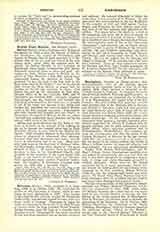

Birinus (BERIN), Saint, Confessor, first Bishop of Dorchester (in what is now the County of Oxford, not Dorchester, the capital of Dorsetshire), and Apostle of Wessex; date of birth unknown; d. December 3, 650, at his see and was buried in his own church there. Later (680) his remains were deposited by Bishop Headda in the cathedral at Winchester, where finally (September 4, 972) Bishop Ethelwold enshrined them in silver and gold. According to Bede, Birinus came to Britain on the advice of Pope Honorius I (625-638), having been consecrated bishop by Asterius at Genoa. He promised “to sow the seed of the holy faith in the inner parts beyond the English”, but on his arrival (634) found the West Saxons so pagan that he decided to devote his ministry to them. God blessed his zeal by the conversion of their king, Cynegils (635), of his son Cwichelm (636), and of Cwichelm’s son Cuthred (639). Cynegils’ daughter (Cyneburga?) was also baptized, and Oswald, the holy King of Northumbria, who had come to Cynegils in suit of her hand, was sponsor to her father and wedded her. Doubtless his presence helped Birinus much in his first spiritual conquests. Immediately after this, Oswald and Cynegils gave him Dorcic, or Dorchester, the capital of Wessex, for his see, where “he built and consecrated many churches and by his labors called many to the Lord”.
Birinus had great devotion for the Body of Our Lord, as is shown in the account of his walking on the sea to procure the corporal given him by Pope Honorius, wherein he ever carried the Blessed Eucharist. Field strangely disposes of this miracle and others as allegorical or fabricated, after allowing, however, that their chroniclers had some common source of information lost to us now. Many miracles took place at the discovery of Birinus’s relics, and Huntingdon among others speaks of “the great miracles of Birin”. At present, there is a growing devotion to him in the Established Church, due probably to the connection of the royal family with Cerdic, a side branch of whose stock was Cynegils. Field enumerates many modern Protestant memorials. The Catholics of Dorchester honored their patron, in, 1849, with a beautiful chapel.
CHARLES L. KIMBALL.

